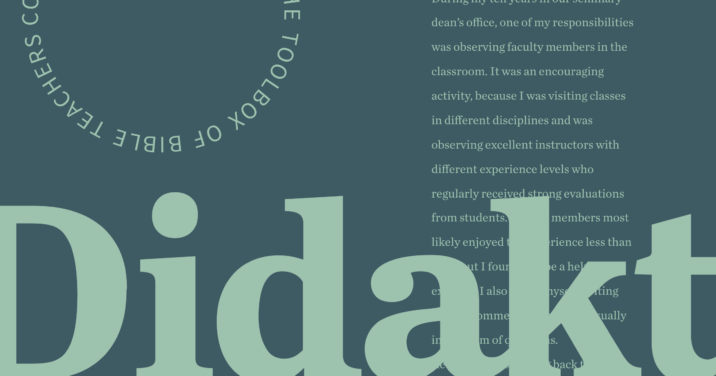During my ten years in our seminary dean’s office, one of my responsibilities was observing faculty members in the classroom. It was an encouraging activity, because I was visiting classes in different disciplines and was observing excellent instructors with different experience levels who regularly received strong evaluations from students. Faculty members most likely enjoyed the experience less than I did, but I found it to be a helpful exercise. I also found myself writing similar comments repeatedly, usually in the form of questions.
Recently, I was looking back through my notes from one semester and found versions of these two related questions recurring in almost every review:
“What do you hope students learned?”
“How will you assess whether they learned it?”
In every class session there was a lot of good content. In fact, there might have been too much content. It sometimes felt as though the goal of the class session was to cover as much material as possible. In some class sessions, the material was nicely coherent; in other sessions it was less so.
During my doctoral studies, the pastor of the church we were attending impressed on me the importance of having a clearly stated objective for every Sunday School lesson I taught. Over the years, I have taken that idea and applied it to any communication opportunity that comes my way—including teaching seminary class sessions. I would recommend it as a practice every teacher should adopt, regardless of the venue or the educational level of the class. Following this practice gives your lesson focus, continuity, and a basis for assessing student learning. To put it simply: have a clear lesson objective and build everything in the lesson around that objective.
Motivational speaker Zig Ziglar was known for this maxim: “If you aim at nothing, you will hit it every time,” The converse is also true, “If you don’t know where you are aiming, you won’t know whether you hit your target.” As theological educators, we should be aiming for growth in our students—growth that goes beyond the cognitive domain to include the affective and behavioral domains. We should be aiming for learning, and we should be aiming to assess whether students actually learn. When you have a clearly articulated one-sentence goal for your lesson—stated as an objective you can assess—you are well on your way to having a target that both you and your students can hit.
I have found that Jane Vella’s idea of achievement-based objectives (ABOs) provides a helpful twist.1 In addition to writing traditional outcomes for each course as a whole to define what students will be able to do by the time a course ends, Vella suggests that we should write objectives for each class session that define what students will have done by the time a class session ends. The difference, of course, lies in what happens during the class session.
Traditional course outcomes work on the premise that during class sessions students will acquire the concepts, attitudes, and skills that will make it possible for them to achieve the outcome on their own at some point after the class session.2 Achievement- based class objectives work on the premise that students not only will be exposed to those concepts, attitudes, and skills, but that they also will have the opportunity to apply them during the class session with real-time guidance from the teacher. Traditional outcomes emphasize the passive acquisition of information; achievement-based objectives emphasize the active application of information. With traditional outcomes, assessment of learning takes place at some point in the future. With achievement-based objectives, assessment takes place in the present, and the teacher has the opportunity to evaluate the extent to which students have begun to learn the material.
Here are some examples that might work for class sessions in several different kinds of seminary courses:
- OT Survey: By the end of this class session, students will have explained the historical, literary, and theological relationships among the books of Joshua, Judges, and Ruth.
- Hermeneutics: By the end of this class session, students will have practiced a proper method for doing a word study.
- Theology: By the end of this class session, students will have articulated a biblically informed doctrine of inspiration.
- Homiletics: By the end of this class session, students will have outlined an evangelistic sermon based on a selected passage of Scripture.
- Ministry: By the end of this class session, students will have designed a baptismal service that is appropriate to their church tradition.
Having a clearly stated, achievement-based objective for each class session makes it easy to answer those two questions I found myself asking so frequently:
“What do you hope students learned?”
“How will you assess whether they learned it?”
The ABO identifies what you hope students will learn. The work they do during the class session lets you assess the extent to which they have learned it. You know where you are aiming, and you can know whether you have hit your target. Of course, crafting and pursuing ABOs for class sessions will require both the instructor and the students to go beyond passive learning to active learning, but that topic is one for another essay.

***
This article was originally published in the February 2023 issue of Didaktikos. Slight adjustments, such as title and subheadings, may be the addition of an editor.
Related articles
- Reclaiming Joy in Teaching
- Language Learning: Empower Students to Take Hebrew and Greek
- What’s the Difference between Preaching and Teaching?
Related resources
Acts: A Commentary for Biblical Preaching and Teaching (Kerux Commentaries | KC)
Regular price: $29.99
- Jane K. Vella, On Teaching and Learning: Putting the Principles and Practices of Dialogue Learning into Action (San Francisco: Jossey-Bass, 2008), 41–45. If you are interested in downloading Vella’s entire book, you can find it a http://mehrmohammadi.ir/wp-content/uploads/2019/12/ Jane_Vella_On_Teaching_and_Learning_.pdf.
- As an aside, I have adopted the practice of writing my course outcomes as ABOs as well.





